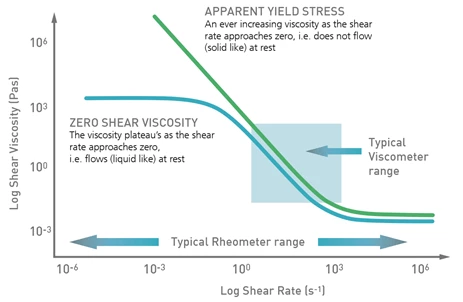Glossar
Viscosity
Viscosity is the resistance of a material to flow. There are two basic types of flow, these being shear flow and extensional flow. In shear flow, fluid components shear past one another while in extensional flow, fluid components flow away or towards one other. The most common flow behavior is shear flow.

Non-Newtonian fluids
Many simple fluids are classed as Newtonian meaning their viscosity is independent of the amount of shear applied. Examples would be water and simple hydrocarbons. As fluid complexity increases, for example by the inclusion of bubbles, droplets, particles or polymers, fluids may take on more complex behavior and show a Non-NewtonianA non-Newtonian fluid is one that exhibits a viscosity that varies as a function of the applied shear rate or shear stress.non-Newtonian response, where viscosity depends on the amount of applied shear. These types of fluids are generally called structured fluids or complex fluids and their behavior can be better described using a rheometer which can measure a range of viscosities over a wider range of shear rates, shear stress and temperature than a simple viscometer.
Such Non-NewtonianA non-Newtonian fluid is one that exhibits a viscosity that varies as a function of the applied shear rate or shear stress.non-Newtonian behavior is common for many industrial and commercial products including toothpaste, mayonnaise, paints, cosmetics and cements, which are generally shear thinning fluids, where viscosity decreases with increasing shear rate, although shear thickening can occur in some very structured fluids.
Applications of viscosity
For most products, the viscosity is required to be high at low shear rates to prevent sedimentation or slumping, but to thin down at higher shear rates to facilitate application or processing. Hence a single viscosity measurement is not sufficient to describe the viscosity of such materials and the viscosity should be measured over a range of shear rates or stresses, or at least at a shear rate relevant for the process or application of interest. Non-NewtonianA non-Newtonian fluid is one that exhibits a viscosity that varies as a function of the applied shear rate or shear stress.Non-Newtonian fluids may also show other phenomenon such as Yield StressYield stress is defined as the stress below which no flow occurs; literally behaves like a weak solid at rest and a liquid when yielded.yield stress, thixotropy and viscoelasticity that can have a major impact on material behavior and product performance.

